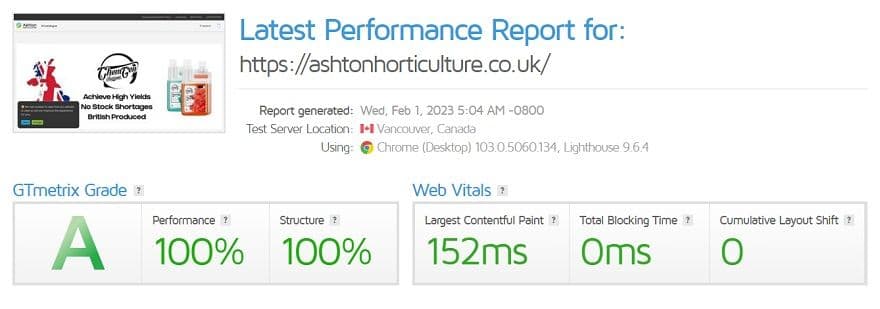How do I increase my website speed and performance?
In this article, we cover some of the key elements of optimising your website's speed and performance to maximise user engagement.
Increasing the speed and performance of your website
The speed of your website is a vital component to managing a profitable online presence.
Not only does a fast, mobile-optimised website increase user engagement - it can also increase your websites ranking on Google search, leading to more traffic and in turn more conversions, leads and sales.
Why aren't all websites fast?
It can be difficult to optimise a website to be highly performant, especially if you're unfamiliar with the technical know-how of the inner workings of a website.
Many websites run by small businesses focus too much on the visual aspect of their site and are unaware of the performance bottlenecks of using the incorrect web technologies, which cause detrimental affects on their profitability.
How to improve your website's speed and performance
There are various methods in which you can improve your website's speed and performance, which we'll cover below.
However before we cover the points, you should understand the disadvantages to your business of a poorly performing website;
The impact of website speed on user experience
A fast and responsive website is vital to the success of your website.
If it is slow loading, users will become frustrated and will leave your site, likely to never return. With a fast website, user experience will be improved and users will be likely to stay engaged, leading to more conversions, sales, leads etc.
The performance of your website covers not only the load speed, but also responsiveness - your website should react to user interaction immediately. This includes page changes, filtering lists, completing forms etc.
It is proven that a slow website will reduce search engine rankings (less organic traffic), engagement and conversions.
Amazon found every extra 100ms of load time reduced sales by 1%. With the average site loading in 2.5s and 8.6s on desktop and mobile, it is clear to see that many businesses are missing out on a whole lot of conversions.
How to identify speed issues on your website
It can be a daunting task trying to optimise your websites speed and performance, where do you start?
The best first point of action should be to conduct a page speed test, using a tool such as Page speed insights or GTMetrix.
Using these tools, you'll be given some pointers on what is causing your websites performance issues.
Minimising page sizes
There are a variety of points to consider when minimising the size of your websites pages. Below we'll cover a few common issues.
Images
Usually, one of the primary causes of a slow loading website is due to imagery.
Ensure you compress and resize images before including them on your site - If you've taken some photography with a high end camera, it'll likely be 4-12MB in size. This is way too large for the web.
The size of the images must be noted - consider a headshot of an article author that's being shown on the website as a 120px by 120px circle. There is no need to upload a full resolution image for this as it'll never need to be rendered at full size.
Videos
Similar to images, videos on websites can cause large bottlenecks. You'll want to compress videos sufficiently if serving them on your website.
Another good method with videos is to 1. Only load the video when it is in view in the browser or 2. Load a placeholder instead, only loading the video when the user clicks play.
Underlying code
Unoptimised and unused code on your website is another common bottleneck for the speed of your website.
WordPress is a culprit for this. If you're currently using WordPress, there's going to be a lot of unused, unoptimised code loading on every page request, which will be massively reducing performance.
To combat this, you should use modern web technologies, or a plain vanilla HTML, CSS and JavaScript website.
This leads us onto the next section of utilising modern web technologies..
Utilising modern web technology for performance
As mentioned above, WordPress is a usual culprit for performance issues with websites.
Getting around this issue, you should start utilising modern technologies such as Next, Astro, Svelte or Gatsby. With these, your website will be lightning fast, leading to a large improvement to user experience.
Check out our article on the benefits of a Next.js website for your business.
Another method for improving performance is by utilising a CDN (Content Delivery Network). This will store cached versions of your website in edge locations, leading to faster initial request and load times.
At NPK Media, we design and develop extremely fast websites that provide the best possible user experience.

Other website speed improvement tips
There's a few other tips we have for improving the performance of your website;
Code minification - If using WordPress, make sure the code of your website is minified. With frameworks such as Next.js, this is an automatic process.
Lazy loading content - Images, videos and other heavy components should not be loaded unless they are required. This will reduce the weight in kb/mb of your website.
Caching - While this won't improve the page load time for a first-time visitor, on subsequent visits, users will notice slightly faster load times as data will be cached in their browser.
Measuring the improvements
Before you try performing any of the tips mentioned above, you should conduct a speed test on a variety of tools and write down/save the results.
Then, each time you make a change to improve the speed of your website, do another round of tests and compare the results.
How can I get a fast website?
If you've had a go at the tips mentioned above, but are still not generating a fast and highly performant website, then get in touch and our web team will investigate your websites issues.
Alternatively, we can provide you with a completely new rebuild of your website to get you a lightning fast website to give your users the best possible user experience.
